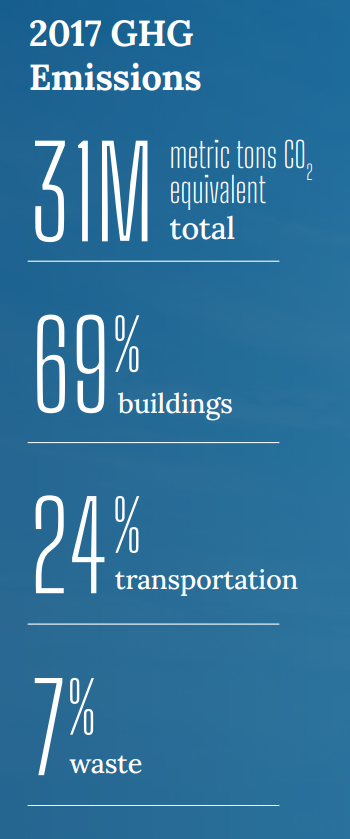Electrify Chicago
An independent tool for viewing City of Chicago building data
According to the
2022 Chicago Climate Action Plan,
69% of Chicago's emissions come from buildings, making
building emissions our biggest challenge and our biggest opportunity as a city
to tackle climate change. At Electrify Chicago, we showcase building performance using
publicly available data supplemented by community-submitted photographs and building
owners.
Start by looking at Chicago's buildings with the highest greenhouse gas intensity i.e. emissions per square foot. Large, efficient, buildings can perform much better than very inefficient small buildings on this metric.
New Article
📰 $30 Million In Missed Fines
The City Of Chicago failed to collect $30 million in potential fines from the building benchmarking ordinance, reducing transparency and accountability.
Legislative update! 🎉
As of late January 2024, legislation is being introduced to require new use more efficient forms of water and space heating, via the Clean And Affordable Buildings Ordinance (CABO), which will reduce the number of highly polluting and inefficient buildings that end up on this site.
If you're in Chicago,
write to your alderman to support the CABO!
Chicago Buildings by Greenhouse Gas Intensity
Note: Data includes large Chicago buildings with data from 2022, unless explicitly stated otherwise.
Note: This data only includes buildings whose emissions are reported
under the
Chicago Energy Benchmarking Ordinance. According to the City “As of 2016,
this list includes all commercial, institutional, and residential buildings larger than
50,000 square feet.” This dataset is also then filtered to only buildings with
reported emissions > 1,000 metric tons CO2 equivalent.
The latest year of data is from 2022, but we update the site regularly when new data is available, and some buildings may have failed to report that year, and only have older data available.
| Property Name / address | Primary Property Type |
Greenhouse Gas Intensity (kg CO2 eq./sqft) |
Total Greenhouse Emissions (metric tons CO2 eq.) |
|---|---|---|---|
|
Garvey Elementary, John W -CPS
(CPS)
5225 N Oak Park Ave
| K-12 School | 8.4 kg/sqft
Highest 22%
| 670 tons
Lowest 38%
|
|
Parish_QuigleyCenter
🕰️
835 N Rush St
| Office | 8.4 kg/sqft | 705 tons |
|
Near North Career Metropolitan High School
🕰️
(CPS)
1450 N Larrabee
| Other - Public Services | 8.4 kg/sqft | 1,594 tons |
|
Mckay, Francis M -CPS
(CPS)
6929 S Fairfield
| K-12 School | 8.4 kg/sqft
Highest 22%
| 1,082 tons
Highest 42%
|
|
Cuffe Math/Science/Tech Academy -CPS
🕰️
(CPS)
8324 S Racine Ave
| K-12 School | 8.4 kg/sqft | 693 tons |
|
Graham Elementary -CPS
🕰️
(CPS)
4436 S Union Ave
| K-12 School | 8.4 kg/sqft | 615 tons |
|
Caldwell Math & Science -CPS
🕰️
(CPS)
8540 S Cregier
| K-12 School | 8.4 kg/sqft | 540 tons |
|
Ortiz De Dominguez -CPS
(CPS)
3000 S Lawndale Ave
| K-12 School | 8.4 kg/sqft
Highest 22%
| 534 tons
Lowest 29%
|
|
Roseland Centre 10450 S Michigan
10450 S Michigan Ave
| Senior Living Community | 8.4 kg/sqft
Highest 22%
| 643 tons
Lowest 36%
|
|
Goldblatts Building
1609 W Chicago Ave
| Office | 8.4 kg/sqft
Highest 22%
| 1,352 tons
Highest 35%
|
|
Wells Street Tower Condominium Association
701 S Wells St
| Multifamily Housing | 8.4 kg/sqft
Highest 22%
| 2,228 tons
Highest 20%
|
|
Thorndale Beach South Condominium Association
5855 N Sheridan Rd
| Multifamily Housing | 8.4 kg/sqft
Highest 22%
| 2,424 tons
Highest 18%
|
|
Lawrence House
1020 W LAWRENCE AVE
| Multifamily Housing | 8.4 kg/sqft
Highest 22%
| 1,578 tons
Highest 30%
|
|
Dwight Lofts
🕰️
642 S Clark St
| Multifamily Housing | 8.4 kg/sqft | 1,654 tons |
|
2555 N Clark Apartments
2555 N Clark St
| Multifamily Housing | 8.4 kg/sqft
Highest 22%
| 1,275 tons
Highest 37%
|
Data Source:
Chicago Energy Benchmarking Data
